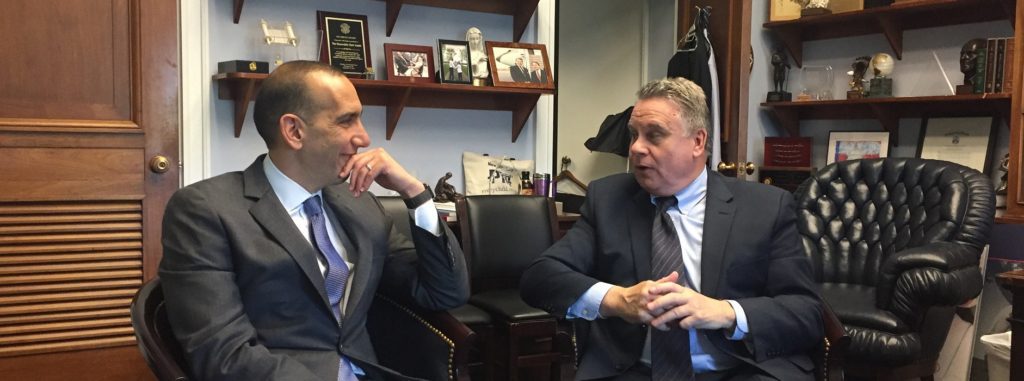Last week, I had the absolute pleasure of sitting down with Representative Chris Smith, a Republican member of Congress from New Jersey’s 4th district and an undeniable champion for the charitable sector.
We sat down in his office on Capitol Hill on a late afternoon because I wanted to learn more about his motivation behind introducing the Charitable Giving Tax Deduction Act (H.R. 5771). Clearly driven by his upbringing in the Catholic faith, Rep. Smith called the nonprofit sector “the linchpin to a more just, humane society.”
Throughout his career in public office, which spans nearly four decades, Rep. Smith said he has regularly turned to the charitable community to learn how different policies would affect them. In line with that thinking, Rep. Smith voted against the Tax Cuts and Jobs Act of 2017. He explained that he did not support it because of the effect it would have on charitable giving and because of the limits on the deductibility of state and local taxes, which would profoundly affect his constituents in New Jersey.
He believes that estimates about how much giving will decrease due to the 2017 tax bill are conservative, and that policymakers need to act fast.
“Damage will be done if we wait. Delay is denial and it’s not going to work out well,” he said. “I think the estimates are grossly underestimated.”
Last year, Independent Sector commissioned research by Indiana University Lilly Family School of Philanthropy, which showed that the 2017 tax law could decrease giving by at least $11 billion. The Tax Policy Center put the figure as high as $20 billion.
Because of this outcome, Independent Sector joined charitable organizations around the country in advocating for a universal charitable deduction, which would give every taxpayer, regardless of whether they itemize, access to the giving incentive. The same Indiana University research found that including a universal deduction would increase giving by nearly $18 billion.
“Incentives are everything,” said Rep. Smith. “We want more money flowing to the charitable sector across the board. When [nonprofits are funded], the culture is improved, the quality of life is improved. Why wouldn’t we want to encourage more of that?”
Still in its early stages of progress, Rep. Smith’s bill has two cosponsors, Reps. Henry Cuellar (D-TX) and Lamar Smith (R-TX). Efforts to advance the legislation with congressional leadership and the tax-writing Ways and Means Committee will require “a full court press, talking to reasonable people,” in the Congressman’s words.
“There is a path forward that is very real,” he said when assessing the bill’s prospects.
Independent Sector is asking the charitable community to show support for this bill and ask their members of Congress to sign on as cosponsors today.
In case there is any doubt, Rep. Smith emphasized just how important it is to him to talk to the nonprofits in his district about how policies would affect them and their ability to serve the people who need help the most. In a recent example, he said he met with local Catholic Charities affiliates and the New Jersey Anti-Hunger Coalition, a program of the NJ nonprofit, Center for Food Action. Both were integral in understanding the effects of the tax bill as well as a recent agriculture and nutrition bill. Further, he said he looks for patterns in his discussions with sector and community leaders, and then builds legislative solutions to address what he’s heard.
“In our individual districts, if we’re doing our jobs, we are in constant contact with the nonprofit sector. I get informed and listen carefully,” Rep. Smith said.
We are grateful for Rep. Smith and encourage policymakers and nonprofit leaders to learn about this bill and join in the effort to ask more members of Congress to cosponsor legislation that will strengthen nonprofits and the communities we all serve.



